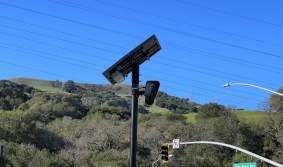ACLU: Virginia state police scanned license plates at political rallies
The American Civil Liberties Union has condemned the Virginia State Police for using automatic license plate readers to collect information about the political activities of the state’s citizens.
According to Rebecca Glenberg, ACLU’s legal director, the VSP recorded the license plates of vehicles attending President Barack Obama’s 2009 inauguration as well as campaign rallies for Obama and vice presidential candidate Sarah Palin.
In total, Glenberg said, the state police collected information on millions of license plates.
“These practices starkly illustrate the need for tight controls on government use of technology for surveillance purposes,” Glenberg said.
She continued: “Monitoring protests and political rallies will chill this fundamental form of expression. We must be able to participate in demonstrations and campaign events without fearing that our license plate will be scanned and stored by law enforcement. Surveillance or perceived surveillance of political events — especially if participation might be controversial — will make law-abiding people think twice before attending.”
Glenbeg noted police forces use the same technology to maintain “hot lists” of vehicles stolen or used in crimes. Data from the ALPRs can be instantaneously checked against these lists to quickly locate suspect vehicles. The impact on privacy rights is minimal, as long as information about license plates not on the hot list is disposed of promptly.
In the cases of the campaign rallies and the 2009 inauguration, the VSP collected personally identifying information on drivers solely because those drivers were heading to a political event. These drivers were not suspected of or connected to any crime — their only offense was practicing their First Amendment rights to speak freely and assemble peacefully.
Belatedly, the VSP asked Attorney General Ken Cuccinelli about the legality of its information-gathering practices.
In a strong opinion, Cuccinelli explained the use of ALPRs for “passive” collection of information violates Virginia’s Government Data Collection and Dissemination Act, the ACLU said.
Since the attorney general’s opinion was issued, the VSP says it has purged its license plate database and now disposes of such information within 24 hours of collection, unless it is relevant to a clearly defined criminal investigation. But return of passive data collection should not be just a bad attorney general opinion away — lawmakers must act to clearly prohibit the VSP from resurrecting this surveillance in the future, she said.
“The VSP’s former use of ALPR data is just one of the ways government uses technology to obtain detailed information about the everyday lives of Americans, along with the National Security Agency’s collection of data on every phone call to or from the United States, or the increasing warrantless tracking of cell phone locations by law enforcement agencies,” Glenberg said. “It is essential that Americans remain alert to these encroachments on liberty and demand that their legislators rein in the use of surveillance technology by local, state and national government.”






